 Update, February 2019: The famous comic about Australia’s preferential voting system, starring Dennis the Election Koala and Ken the Voting Dingo, has been revised, updated, and completely redrawn in spectacular full colour! Please find it at its new home here.
Update, February 2019: The famous comic about Australia’s preferential voting system, starring Dennis the Election Koala and Ken the Voting Dingo, has been revised, updated, and completely redrawn in spectacular full colour! Please find it at its new home here.
This blog post will remain here, but if you’re looking for that comic and want to share it, please use the current version, not this one. Thank you!
Dennis the Election Koala gives Ken the Voting Dingo an important lesson in civics!
Any time there’s a federal election approaching, you’ll see and hear Australians saying things like, “I’d like to vote for [Minor Party/Independent] but the most important thing is to keep [Major Party A] out, so I’d better vote for [Major Party B].” But this concern doesn’t apply in Australia; we have a more elegant voting system than that. We seem to have picked up ideas about “wasting your vote” from American TV shows or something.
So here’s a comic designed to clear up this common misconception and explain how preferential voting works! It’s four pages long — just the right size for a pamphlet. I’ve tried to make it non-partisan and future-proof, and you are encouraged to share it online and in print. Letterbox your street or apartment building, or hand out copies at a polling booth! Scroll down and you’ll find the comic in various formats for sharing and printing. (EDIT: Now including a ‘radio friendly’ version!)
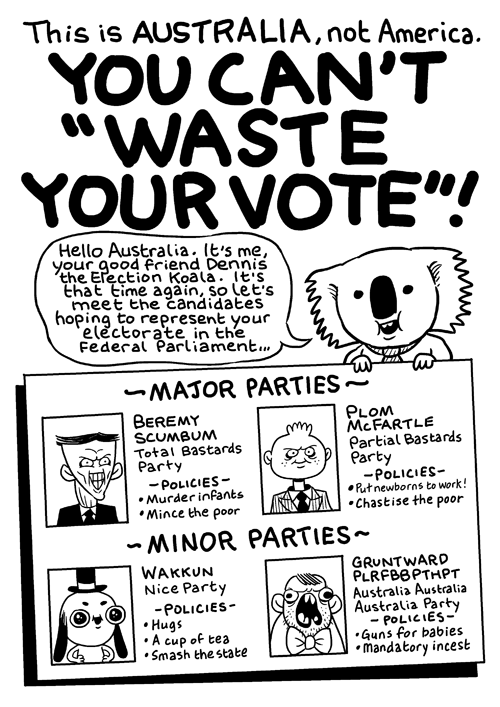
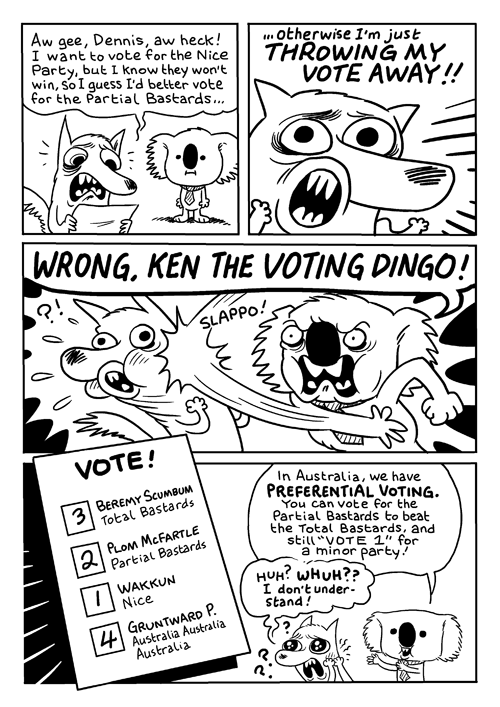
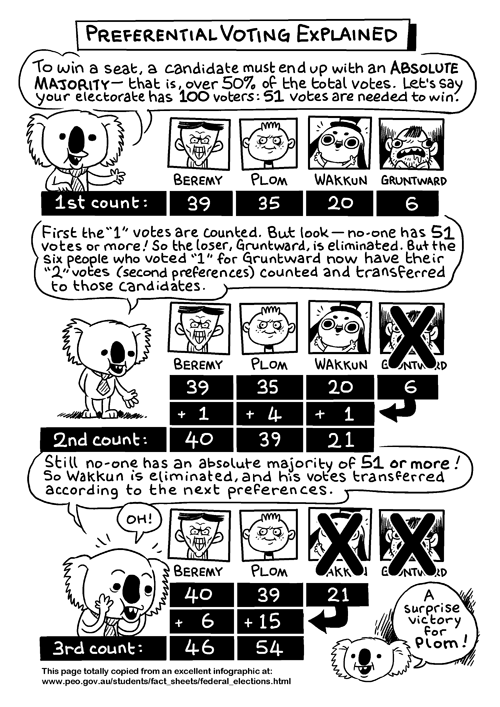
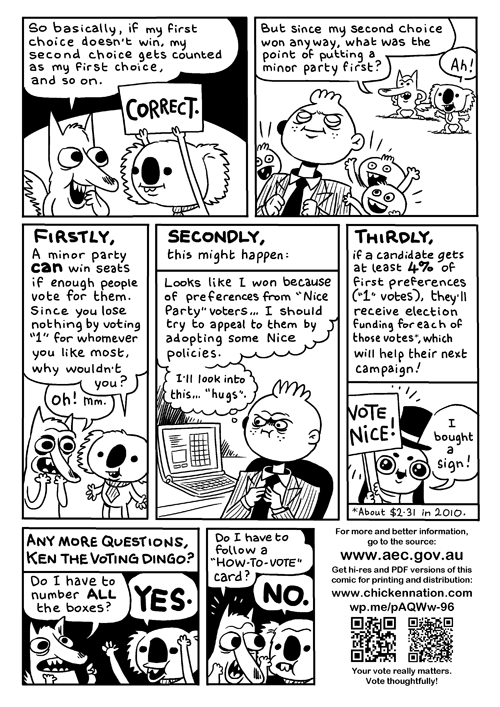
For sharing on the web:
- 500 pixels wide: Page 1, Page 2, Page 3, Page 4
- 700 pixels wide: Page 1, Page 2, Page 3, Page 4
- 700 pixels wide, single image
For printing and copying a pamphlet:
Make an A5 pamphlet by printing a double-sided A4 sheet and folding it in half. Print a few and letterbox your street or building — or copy a whole bundle and hand them out at a polling booth! Remember, photocopying’s free when you do it at work.
- Hi-res (PNG format) A4 sheet: Side 1, Side 2
- PDF version — ready to simply print and fold
High resolution:
A4 pages, 300 dpi, aliased black-and-white. This is the size I drew them at, with my tablet. Page 1, Page 2, Page 3, Page 4
NEW!!! Radio-friendly version:
By popular request, I have created a ‘softer’ edit of the comic in order to make it as accessible as possible. This version contains no references to bums, farts, bastards, murder, babies or incest. (One funny cartoon animal still slaps another funny cartoon animal in the face though, because come on people.) If you had any reservations about sharing or letterboxing the comic, have them no longer!
- 700 pixels wide, single image (radio edit)
- PDF version (radio edit) — ready to simply print and fold
- High resolution: Page 1 (radio edit), Page 2 (radio edit); Pages 3 and 4 required no changes
DECLARING MY INTERESTS: I’m a member of the Australian Greens — a minor party, how about that! But this comic is intended to be non-partisan and informative. In fact, the whole message of the comic is, you can and should vote for exactly who you want to! We’re fortunate to have preferential voting in Australia so we ought to understand how it works.

This work is licensed under a Creative Commons Attribution-NonCommercial-ShareAlike 3.0 Australia License, if you were wondering. I should reiterate that the third page was derived from an infographic on the PEO website under the assumption that they wouldn’t mind.
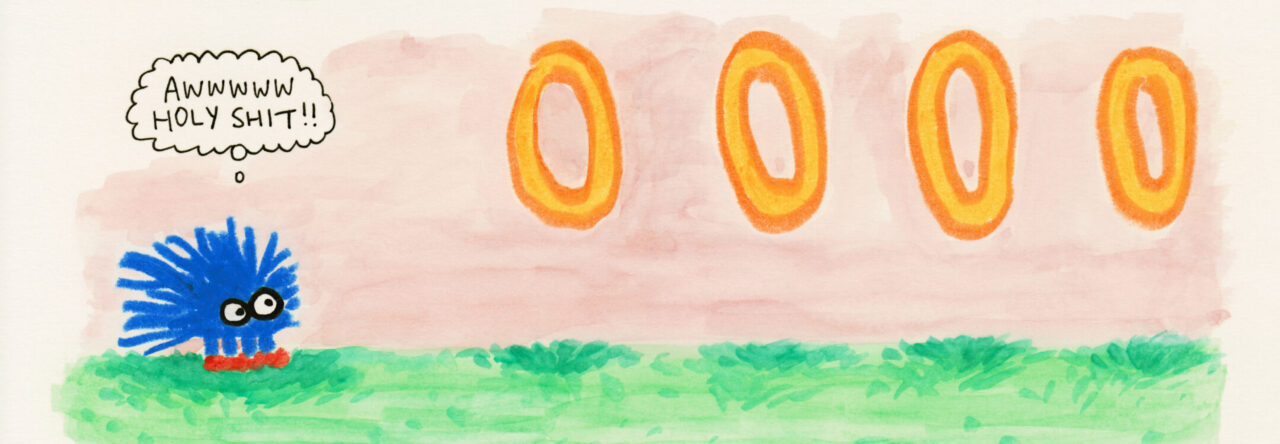
Sue
I would really like to thank you for this cartoon, it was informative and easy to understand and for the life of me i cant figure out why it isnt sent to everyone instead of all the useless election mail we recieve every darn election. i know quite a few people who vote informal, simply bcause they think their one little vote doesnt count. I am sending this to all of them.
Thank you again and good luck for this election.
Naomi
Thank you this is brilliant and should be handed out at high schools, I know so many young people who don’t even enrol to vote. The one thing I would suggest you add is that if you only vote ‘1’ then the party you voted for get to allocate your preferences so your vote STILL isn’t wasted. Personally I prefer to choose my preferences.
Patrick
As I’ve said, this comic isn’t about the Senate vote. There just wasn’t enough room. It seems like I could have made that much clearer though!
Honestly the comic is not much more than a rushed first draft. Not how I normally work but in this instance I decided that putting out something ‘good enough’ in a timely fashion was better than putting out nothing.
Joe
Now you need to do a similar comic explaining the principles of voting for the Senate.
Patrick
That’ll be my 100-page graphic novel.
Seriously though, explaining the senate vote is a bit beyond me I think. I’m no Antony Green — just a relatively informed layman trying to be helpful.
Wayne Davis
Thanks. How about a comic strip for the senate vote. Maybe pointing out the flaw in unweighted inclusive gregory to raise awareness of it.
Patrick
See above! I had to google ‘unweighted inclusive gregory’.
In any case I suspect that’s the sort of digression that would undo the purpose of an infographic. ‘Inside baseball’ is the term, I think.
Wayne
you are now top 10 in google for that term :)
Jed Barber
In getting caught up in explaining how Australia’s voting system works, you’ve completely missed how utterly broken it still is.
The preferential system we have is only anywhere near sensible when there are no parties, or when there is only one winner allowed. Obviously, neither of those conditions are present. Parties are omnipresent and there are 150 winners.
So, what happens with this system under those conditions? Massive geographic bias. Like-minded voters that are in the one place will get representation, while the same voters spread out over a wider area get nothing. You are a member of the Australian Greens. You should *know* this. In the 2010 federal election, the Greens obtained enough primary votes that under a fair system they should have been entitled to about 18 seats. Instead they got only one, and they are likely to lose even that this time around due to Labor and Liberal acting to protect their political duopoly.
Did you know that 2010 was the first time a third party has won a seat in the House of Representatives since the great depression, unless you count splinter groups of the Liberal Nationals? The possibility of third parties in government is almost entirely theoretical.
Next time you get the chance, ask some Green MPs why on earth they haven’t leveraged their position to get a Royal Commission on our electoral system happening yet.
(And no, Single Transferable Vote is not an appropriate solution. The Tasmanian House of Assembly and ACT Legislative Assembly are still badly flawed. If you want an example of something that functions fairly well, I suggest you look to New Zealand instead.)
Patrick
Got that out of your system, have you? Well, happy to help.
I’m not an advocate for Australia’s system; I just want to explain how it works. I happen to think it’s better than most, but I agree that New Zealand’s is better.
You’ve got a lot to say; maybe try drawing your own comic about it? Serious suggestion.
Jed Barber
So I failed to keep that tinge of bitterness out of my post? Yeah, OK, sorry about that. It was probably your last line about us being fortunate to have our preferential system that got me.
I’m in the process of constructing a website, but income related matters keep getting in the way.
Michael
Patrick, well done on creating this.
It’s got viral written all over it – popped up three times in my Facebook stream already. Really hope you’ve got a server that can cope. (I mean, I really, really hope that you do, because it would be a real shame if its exposure was limited by bandwidth).
Jed, well done on realising that no matter how valid your rant may be Patrick’s only intention was to explain the existing system, which I suspect the majority of Australians don’t understand. He’s done a great job, and it’s already secured the Greens an extra vote from a very intelligent, but only partially politically engaged, friend of mine who would otherwise have simply followed the Liberal How To Vote card.
If Australians understood the system I have little doubt the Green vote would increase, and a movement would slowly develop which questioned how appropriate small geographically-based electorates with a single representative are in Australia in the 21st century.
Mark N
Well the whole point of the House of Representatives is to provide representatives for the people in electorates of specific geographic areas and this beneficial in the 21st or any era because it provides representation in Canberra for people with common beliefs and concerns eg Agricultural or mining areas, blue or white collar, young or old.
To provide representation without geographic electorates as you mention the representatives would have to support some sort of generic, global policies.
Now this is great for parties like the Greens, whose policies are national an don’t generally reflect local concerns, issues, beliefs but for the majority of Australians, who want someone local who represents local concerns it would be disenfranchising.
Naomi
I think that a different type of system ‘may’ work. What there were no ‘parties’ allowed. You could have a number of people nominate in each electorate, the people vote for the representative they want. The representatives go to Canberra, and they vote for who they want to be the prime minister, the treasurer, ministers etc. ALL votes are conscience votes, and the Senate can Veto any legislation they try to pass.
Patrick
No worries mate and all the best with the website project.
There’s nothing in the world that can’t be improved, but I do think we’re fortunate to have preferential voting.
Minz
I’ve seen the alternative at close quarters… the party that won the last election in Canada was hated by a good proportion of the population, but hey, they did get almost 40% of the votes…
Nicola
That happens to me the most constructive stream of ‘differing opinion’ I have seen on any post, anywhere. Nice work Jed, Patrick and Michael!
AmyP
Thank you for posting this. I came of age in Australia, and when I moved back to Canada (Which has a one vote/one party system) I thought the Canadian way was really ass backwards.
I have shared this with my Canadian pals and they wonder why the hell we do it the way we do in Canada.
Good luck in your upcoming election. As a citizen, I should probably look into the issues and throw an absentee vote down there.
Patrick
Thank you to all commenters, past and future! I’m pleased the comic’s getting so much attention, since that is, after all, the whole point. Thanks for spreading the word.
Alberto R.
I’m italian, but this is FANTASTIC!
And I really like we we’ll implement a similar voting system here. Our current voting system was called, from the very person that invented it, ‘porcellum’, something like ‘porky’. And there’s a reason for that!
Gav
Great comic, I really enjoyed it. However I have a few questions that it doesn’t explain:
Does my 3rd preference get the vote if my 2nd preference was eliminated before my 1st preference was eliminated?
If my 2nd preference gets my vote, but is later eliminated, does my vote change to who I preferenced 3rd, or does it go to the party that my 2nd preference preferenced?
Patrick
Q1. Yes, correct!
Q2. The former. YOUR preferences are followed. If you hear someone talking about a party’s preferences, it means the preferences they recommend to voters on how-to-vote cards. A party is not a voter, so it can’t actually have preferences in the sense that you do! (Although, in senate voting, it kind of can, sort of, when people vote above the line… but that’s a separate topic.)
I kind of wanted to go into a few hypotheticals like this in the comic, but, gotta keep it digestable.
Oh, and, DISCLAIMER: Not an expert! Don’t work for the AEC!
AaronB
Great comic, I understand the need for the koala and dingo but you missed the obvious donkey joke.
Shared with my friends, hopefully it can educate a few more people to take voting seriously.
annie
Patrick! I go for the Greens too!
I totally forgot you (and this site) existed and now people are reposting it on facebook. It’s pretty cool.
Patrick
Hello! Thanks! Which Annie are you??
Tony Single
Hey Patrick, I’m delighted to see that you’re still going strong! I’d always hoped you would. And I have to say that your voting strip actually made sense of something that’s… well, not made much sense to me. Until NOW! Anyways, I thought I’d just check in and say, “Hi!”
Hullo.
Patrick
Tony Single! Hey man! So good to hear from you! Hope you’re doing well.
Marion
The Senate is very important also. Isn’t the difference here that we are voting for senators for the whole of each state/territory. and because of this the voting forms can be very large. Hence the voting above the line system makes it a simple choice of one vote. The party has pre-registered its preferences and a vote above the line follows the party’s preferences. If we as voters don’t agree with whom the party pre-selects for its preferences the voter can choose to vote below the line for their own preferences. In which case the comic is valid.
monkeytypist
Seriously though, putting out a “number every square” message without even mentioning the Senate is worse than useless advice, particularly if you are interested in boosting a minor party. The Senate is way more important than the HoR for the minor parties, and you’ve made a comic that would confuse anyone who tried to use it to vote in the Senate.
Patrick
Can’t do everything, I’m afraid. Though I suppose I could have made it clearer that the comic is specifically about the House of Reps.
The Senate is, as you point out, already good for minor parties because proportional representation makes it easier for them to get elected. Personally I’d like the House of Reps to be just as good for minor parties, but that requires more people to understand how preferential voting works — hence the comic.
Josh
I think it’s great that you’ve done this in a non-biased way; I like how you state what you support without trying to push that on others. I can’t say that happens often when asking people of their political preference these days…
Thanks for an awesome illustration!
David Hiscox
This comic explains the voting system very well, but it is not impartial. You’ve basically made a comic for people who want to vote for the Greens, but feel they have to give Labor their number 1 vote to keep the Liberal Party out. Credit for the disclaimer, but it was obvious regardless.
David Hiscox
PS I vote Liberal.
Patrick
For the record, while I support the Greens personally, I’m also broadly in favour of more parties; more options; more representation of truly diverse political positions. Not a fan of two-party systems.
So while my own biases may well be showing, my attempt to make this comic as non-partisan and inclusive as possible was genuine.
David Hiscox
I believe that you believe that you are being as non-partisan and inclusive as possible, but again I would suggest that you have failed quite badly. There is nothing inclusive about labelling minor parties on the right as racist inbreds. And characterising the Greens as being a little wacky but overall benign, is as non-partisan as my characterising the Greens as being a little wacky and wanting to destroy the economy.
The only way to actually be non-partisan would be to have Major Party A, Major Party B, Minor Party A, and Minor Party B. Admittedly I would not find it anywhere near as entertaining as what you have produced, but in claiming that your comic is non-partisan when in fact your biases are completely transparent, you are trying to have your cake and eat it too.
Patrick
Oh, you “believe that I believe” do you? What else can you see from atop your lofty spire of objective enlightenment? These are rhetorical questions of course because I’m about to close the comments and leave you to stew.
Mick
Thanks you so much for this. I have gone blue in the face trying to explain preferential voting to otherwise rational, intelligent and politically engaged people who simply don’t get it.
Jimmy
How do the party preferences work? Like how liberal party gives its preferences to labour instead of greens?
Patrick
Please see my reply to Gav, above.
Put simply, each voter has total control over his/her preferences. Parties can only make recommendations to voters. (However, in Senate voting, if you vote above the line, you are relinquishing this control to the one party you vote for; asking them, basically, to number all the boxes on your behalf. Again, though: this comic is not about Senate voting.)
Westy
Nice one, Patrick.
Laura Anne Seabrook
So what about one of these for the upper house, and the difference between above and below the line?
Patrick
No time, and lack the expertise.
I suppose it would be easy enough to explain Senate voting as far as the voter is concerned… it’s explaining the ‘back end’ that’s beyond me. Well, maybe one day.
Jason
I like the cartoon… Great work!
Shaun
I like this post both because it puts a fairly complicated concept into an entertaining and digestible form, and because I encourage anything that encourages the benefits of third party voting (interest: I too vote Green).
However I do think it glosses over one point, and makes the situation seem more black and white than it is. Put simply, I *do* risk losing something, from a pragmatic point of view, if I vote for a third party. It doesn’t come for free.
Suppose my electorate has 100 voters, and the major party I prefer gets 50 votes, while the major party I don’t prefer gets 45 votes. And suppose I am one of the 5 votes that go to a third party. Now, my electorate must go to its second preferences. And while my vote *will* help the major party I prefer, it is still possible that they won’t win (depending how others’ second preferences go). If I had put a “1” next to the major party I preferred, they would have received 51 votes, and they would have won. No need for second preferences.
While this is an unlikely situation, it is thoughts like these that go through people’s heads when they’re in the voting booth.
Patrick
I don’t follow you, Shaun, though maybe that’s my own fault — never had much of a head for numbers.
In your example, it seems to me that if your preferred major party needs only one more vote, and they get yours (based on your preferences), they win. No worries.
I mean, your non-preferred major party will still only end up with 49 votes (45+4) at the most.
What am I missing here?
Jill
Thanks Patrick,
I’m 51 and never understood how that worked. It was really causing consternation this time around.
Patrick
Jill, are you 51 outright or after preferences? :)
Old Phart
Great and informative comic strip and good to see. As Someone who has never voted Labour and never given my vote to the Liberals I say have a bit of fun and send a message. Who in their right mind could resist voting for the Party Party Party Party or The Sun Ripened Green Tomato Party! Only matters who you put last. This is about who you least want to elect so the last position matters most.
SEND A MESSAGE to the Pollies and their Parties. Pity we can’t do something to Murdoch to limit his vote!
Erica
Sorry, as good as this cartoon is, I don’t understand why the ignorant one/Dingo had to be treated with violence. Did the Koala have some unresolved issues? Payback for past predation on the koala’s ancestors? I would have used a Wise Koala who gently corrected rather than punished the dingo’s ignorance. The rest of it is great and helped me understand the system a bit better. Thank you.
Patrick
They are cartoon animals, Erica. It’s what they do.
And you’re welcome!
John
Love what you’ve done Patrick!
Will definitely print some off for my neighbours before election day.
Have added some links and info about this page over at my site with the hope you’ll get a little bit more traffic from my circles.
If you can think of a simple way to explain the Senate… OK, I guess we’re all screwed thinking about that one!
Kind regards,
John
Danny Rose
Please correct me if it’s not the case that that preferences are not counted if a candidate exceeds 50% of primary votes? If so, I’m obliged to vote Labor to prevent LNP winning outright.
Patrick
If a candidate wins an absolute majority (over 50%) from primary votes, then no, I suppose preferences wouldn’t be counted because that candidate has won.
Concluding from that that you’re obliged to vote for a major party is a huge leap; not sure how you ended up there! In our hypothetical 100-voter electorate, if Party A gets 51 primary votes, they’ve won, and that’s that — whether Party B would get 49 votes from primary votes or from preferences doesn’t make a difference.
Lottiej
Thanks for this, I already understood but it is the most fun and clear explanation of the process I have read. It’s a pity about some of the language as this would be a great resource to use in schools in their government unit.
Patrick
Based on some feedback I’ve received, I am considering doing a sort of ‘radio edit’ of the comic, to make it as accessible as possible. Unfortunately, I will almost certainly not have time to do this before the election, plus I’m about to lose proper internet access for a few weeks anyway. But stay tuned!
Patrick
Hello all,
Just letting you know, I’ll be closing comments on this post soon; maybe later tonight. I have just today moved to another country (nothing to do with politics; shush) and am about to start a new job and also lose internet access for at least a few weeks — so on top of being busy, I simply won’t be able to approve anyone’s comments to be posted.
I might open comments up again once I’ve got internet access back… then again I might not. As interesting as some of these discussions are, I’m not sure this is the ideal forum for them.
Thanks again for all the interest and feedback! Please keep sharing the comic, however you can.